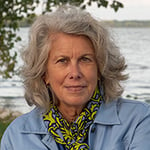Published: April 27, 2022
Kendal at Oberlin, and Kendal Corporation’s other affiliates are independent and not part of, or sponsored by any religious or social institution, but they were founded and continue to grow with intentional regard for the principles of the Religious Society of Friends, also known as Quakers. Throughout 2022 we will explore Kendal Values and Practices and how they guide community life at Kendal at Oberlin.
When Kendal at Oberlin founded The John Bartram Arboretum in 2015, the community celebration was robust. But the 100+ acre arboretum was just the latest in Kendal’s rich history of environmental stewardship, which continues to grow and blossom today.
In Kendal at Oberlin’s new Strategic Plan (2022-2026) one of its seven goals is to “Greatly strengthen and extend Kendal at Oberlin’s conservation and sustainability initiatives, including cost-saving measures and reductions in greenhouse gas emissions, consistent with the City of Oberlin’s Climate Action Plan and recommendations from its Climate Adaptation Task Force.”
“The new strategic plan supports much more ambitious goals to address climate change than the previous plan,” notes Ted Wolner, chair of the Environmental Concerns Committee.
Details in Kendal’s 5-year strategic plan
The life plan community is striving for a significant reduction in its carbon emissions by 2030 and making the campus more sustainable. Some of the actions identified to reach these goals include:
- Calculate Kendal’s annual carbon emissions to establish a baseline by which to measure future emissions cuts, and conduct an energy audit via the City of Oberlin’s Efficiency Smart program
- Improve energy conservation on campus
- Replace Kendal mowers, go-carts and vans with electric models
- Decrease food waste beyond present composting and increase local and regional sources of food
%20(2).png?width=311&name=Untitled%20(640%20%C3%97%20480%20px)%20(2).png)
%20(1).png?width=311&name=Untitled%20(640%20%C3%97%20480%20px)%20(1).png)
%20(3).png?width=312&name=Untitled%20(640%20%C3%97%20480%20px)%20(3).png)
Some of these actions, such as a new solar installation and energy-efficient lighting, are well underway. Last summer Kendal mounted 60 solar panels on a new garage and carport, each with 2 EV charging stations. These panels will generate enough electricity to light both buildings, power the charging stations and illuminate 75 energy-efficient LED light poles and posts, which will replace aging sodium lights over the next three years.
Not only will the new lights reduce electric consumption, but they will greatly reduce light pollution, which is a serious environmental problem, significantly improve star-gazing and habitat for animals and plants that thrive at night, and create a safer campus.
Kendal has formed an ad hoc committee to pursue certifying Kendal as a “dark sky community,” which means reducing exterior light pollution with energy-efficient lighting. Ohio has only one site certified by the International Dark-Sky Association (Geauga Observatory Park) and there is no continuing care retirement community on the international list that is so certified.
“I’d love to make Kendal the first,” says resident Terry McGowan, who worked for nearly 40 years at GE and now runs a consulting business.
Ongoing education efforts, both on and off campus, are also included in the strategic plan. A fairly new advocacy and educational outreach organization is SSAFE (Senior Stewards Acting For the Environment), which is comprised of about 150 volunteer residents from several continuing care retirement communities, organized by residents of eight Kendal affiliates, including Oberlin.
“We constantly are letting the 4,000 residents on the different Kendal campuses know what we are doing,” says Ted Wolner, a SSAFE board member. “We work collaboratively with Kendal corporation administrators, and with Kendal campus CEOs, CFOs, Facilities Directors, and residents to reduce emissions as much as possible and attain carbon neutrality before 2050.”
Back to Kendal’s 100+-acre campus
The Kendal Master Landscape Plan completed 2 years ago calls for some currently mowed areas of the Kendal campus to be converted to meadows, low/no mow grasses and other alternatives. Advantages of this kind of ground covering include no fertilizer, minimal water usage, a lot less maintenance, many fewer emissions, and added carbon sequestration in the roots of the new plants and trees. This conversion is underway in several campus locations.
National Arbor Day is an annual celebration at Kendal, and events are once again open to the public. Resident David Benzing’s talk is April 29, Arbor Day (the last Friday in April): “What’s a Tree: How Do Trees Contribute to Earth’s Life Support System and Human Welfare?” at 7:15 p.m. in Heiser Auditorium. On May 5, Valerie Trouet, author of “Tree Story: The History of the World Written in Rings,” will discuss what we can learn about climate and forest history from tree rings. Her presentation is also 7:15 p.m. in Heiser Auditorium.
At The John Bartram Arboretum, the focus is on adding indigenous plants and trees best suited to Ohio’s warming Midwestern climate and adding trees that increase shade and protection. Committee members are in the process of developing a collections policy and completing other projects that will elevate the arboretum’s accreditation to Level II. When that milestone happens, another celebration will surely follow.
Check Out Our New Gardening Guide:
Gardening is a great activity at all ages. Get helpful tips here!
 In the past, Molly Kavanaugh frequently wrote about Kendal at Oberlin for the Cleveland Plain Dealer, where she was a reporter for 16 years. Now we are happy to have her writing for the Kendal at Oberlin Community.
In the past, Molly Kavanaugh frequently wrote about Kendal at Oberlin for the Cleveland Plain Dealer, where she was a reporter for 16 years. Now we are happy to have her writing for the Kendal at Oberlin Community.
About Kendal at Oberlin: Kendal is a nonprofit life plan community serving older adults in northeast Ohio. Located about one mile from Oberlin College and Conservatory, and about a 40 minute drive from downtown Cleveland, Kendal offers a vibrant resident-led lifestyle with access to music, art and lifelong learning.
.png?width=640&name=Untitled%20(640%20%C3%97%20480%20px).png)




